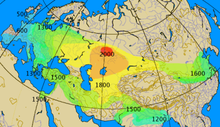rupol2000
Gold Member
- Aug 22, 2021
- 18,215
- 2,621
- 138
- Banned
- #1
There is no doubt that now many traces have been deliberately destroyed, but a huge number of common signs still remain, and everything converges to one point.
The fact that the Americans genetically are related to the Siberian peoples of the Altai and Chelyabinsk regions is not an accident.
The early religions of America and Siberia coincide, this is shamanism.
The art of the rider remained in the USA, this is the same as that of the Cossacks
In both cases, it is customary to consider traditional art of these peoples, and modern borrowing is not assumed. That is, they come from ancient common roots.
Probably America is the birthplace of the horse, it seems archeology confirms this.
The cowboy's clothes are similar to the national clothes of the Hungarians.
It is for this reason that American right policy actually repeats the policy of Austro-Hungaria.
There are too many signs of commonality to write off this as a coincidence.
The fact that the Americans genetically are related to the Siberian peoples of the Altai and Chelyabinsk regions is not an accident.
The early religions of America and Siberia coincide, this is shamanism.
The art of the rider remained in the USA, this is the same as that of the Cossacks
In both cases, it is customary to consider traditional art of these peoples, and modern borrowing is not assumed. That is, they come from ancient common roots.
Probably America is the birthplace of the horse, it seems archeology confirms this.
The cowboy's clothes are similar to the national clothes of the Hungarians.
It is for this reason that American right policy actually repeats the policy of Austro-Hungaria.
There are too many signs of commonality to write off this as a coincidence.
Last edited:




